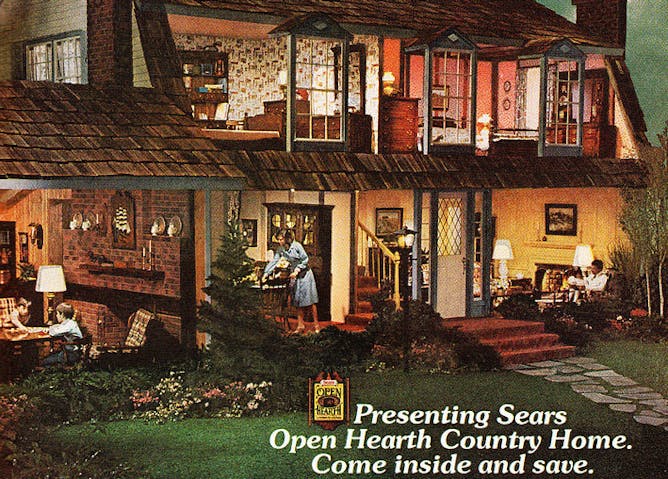|
|
|
Editor's note
|
|
More than two-thirds of U.S. states could soon have legal marijuana of some kind. Medical marijuana will be on midterm ballots in Utah and Missouri. In Michigan and North Dakota, where medical use is already legal, voters on Nov. 6 will decide on recreational pot. Many analysts think marijuana has now reached a tipping point and its nationwide legalization is inevitable. But researchers Daniel Mallinson and Lee Hannah, of Penn State and Wright State universities, say some Americans won’t get legal weed any time soon.
Families who send their children off to college now have another risk to consider: losing their homes. Researchers found that whenever there is an increase in the percentage of students going off to college, thousands of additional foreclosures take place nationwide the following year.
Sears, which recently filed for bankruptcy, helped pioneer the mail-order catalog, bringing mass consumerism to millions of Americans long before the internet. The retailer also changed American culture, allowing women and people of color to participate in society and citizenship like never before, writes Einav Rabinovitch-Fox, a historian at Case Western Reserve University.
|
Catesby Holmes
Global Affairs Editor
|

|
|
Top stories
|

Utah residents show support for a ballot initiative that would legalize medical marijuana in the state.
AP Photo/Rick Bowmer
Daniel J. Mallinson, Pennsylvania State University; Lee Hannah, Wright State University
Midterm voters in Utah, Missouri, Michigan and North Dakota will decide whether to join the 31 US states that have some form of legal marijuana. But ballot initiatives can only take pot so far.
|

Many parents borrow against their homes to send their children to college.
Andy Dean Photography/www.shutterstock.com
Jacob William Faber, New York University; Peter Rich, Cornell University
The odds of foreclosure double for families who send their kids off to college, according to two researchers who say their findings show a need for new ways for Americans pay for higher education.
|

The Sears catalog made it easier for anyone to live the American dream.
Classic Film
Einav Rabinovitch-Fox, Case Western Reserve University
Sears and other department stores not only changed how Americans consumed but altered the very nature of society and culture as well.
|
Politics + Society
|
-
Jeff Gruenewald, Indiana University-Purdue University Indianapolis; William Parkin, Seattle University
The shooting at a Pittsburgh synagogue joins a list of more than 200 other ideologically motivated attacks by far-right extremists since 1990.
-
Judith Kelley, Duke University
While the US sends observers around the world to monitor elections, few will be present during the 2018 midterms in the US.
-
Jennifer Lynn McCoy, Georgia State University
A polarized electorate is divided into tribal camps that demonize each other. That's the setting for the upcoming midterm elections. If the US continues down this path, democracy will suffer.
|
|
Science + Technology
|
-
Nazanin Andalibi, University of Michigan
How do women decide whether – and what – to say about their pregnancy loss experiences on social media?
-
Margee Kerr, University of Pittsburgh
Visiting a haunted house or watching a horror movie can be terrifying and enjoyable at the same time. A sociologist explains the psychological benefits of being safely scared.
|
|
Ethics + Religion
|
-
Stephanie J. Nawyn, Michigan State University
The idea of welcoming the stranger is central to Christianity, Judaism and Islam. Today, that engenders a responsibility to shield refugees and other immigrants from violence and oppression.
-
Kalpana Jain, The Conversation
On Oct. 31, 1517, a German monk, Martin Luther, started the Protestant Reformation. Its impact went far beyond the split in the Church that most people are familiar with.
-
Meghan Henning, University of Dayton
Hell-themed Halloween attractions play on people's fears. The early depictions of hell were meant to use fear as a moral guide to help others.
|
|
|
|
Trending on site
|
-
Frank M. Mitloehner, University of California, Davis
Raising livestock has clear impacts on the environment, but contrary to what many critics say, it is not the biggest driver of climate change.
-
Wenyao Xu, University at Buffalo, The State University of New York; Feng Lin, University of Colorado Denver; Zhanpeng Jin, University at Buffalo, The State University of New York
Biometrics are more secure than passwords – but when they're compromised fingerprints and retina scans are hard to reset. Brain responses to specific stimuli are as secure and, crucially, resettable.
-
Steven Tammariello, Binghamton University, State University of New York
The US went crazy for Seabiscuit when he won his famous 1938 match race against War Admiral. Now researchers are investigating the thoroughbred's DNA to see what made him such an unlikely success.
|
|
|
|
| |
| |
|
|
|
|
|
|
|